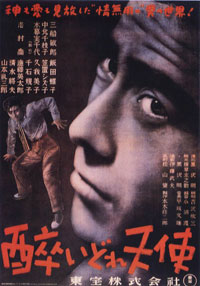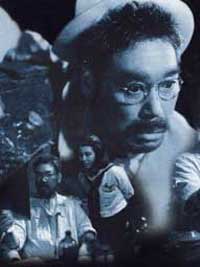 To an appealing very simple guitar soundtrack, we're introduced to an old physician (Takashi Shimura) in the slums of post-war Tokyo. An injured thug (Toshiro Mifune) comes into the doctor's office, scowling & full of menace, but in obvious need.
To an appealing very simple guitar soundtrack, we're introduced to an old physician (Takashi Shimura) in the slums of post-war Tokyo. An injured thug (Toshiro Mifune) comes into the doctor's office, scowling & full of menace, but in obvious need.
Claiming to have hurt his hand in a door, the doc removes a bullet, then stitches the wound intentionally allowing the gangster plenty of pain. More importantly, the doctor realizes this young yakuza is tuburcular.
The two main characters are thus quickly in place for Drunken Angel (Yoidre tenshi, 1948), with Kurosawa's recurring premise of wise old coot mentoring young lost soul.
This was the first time Akira Kurosawa worked with Toshiro Mifune, & co-starring him with the great Takashi Shimura is a dream-cast for charismatic performances.
The next day we see the slum doctor on rounds in streets where children play & splash in sewage, during the heat of summer.
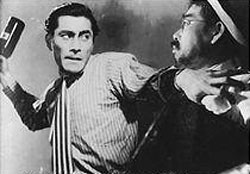 The empathetic doc, heroic in his regard for the health of the poor, isn't entirely a saint, for he's a notorious drunkard. And when drinking, short tempered. The empathetic doc, heroic in his regard for the health of the poor, isn't entirely a saint, for he's a notorious drunkard. And when drinking, short tempered.
The gangster he stitched up, Matsunaga, runs a bar called Bolero. Doc Sanada has a bug up his butt about yakuza & wants to dislike Matsunaga. But he likes the idea of access to good liquor.
He befriends the gangster additionally because he believes the TB could but cured if quickly tended to, though the gangster refuses even to admit he's ill, let alone do something about it.
The soundtrack's guitar we soon realize is not the usual music-from-nowhere that accompanies nearly all films, but is provided by a young man of the streets, played by one of Kurosawa's stock players, Sachio Sakai.
One day a gangster, Okada (Reisaburo Yamamoto), just out of prison, demands the street-musician's guitar to perform his personal theme, "Song of the Killer," in order to announce his return to the neighborhood. Doc Sanada's nurse (Chieko Nakakita) had been Okada's girlfriend. She still fears & desires him, though formerly he had nearly been her ruin.
Matsunaga acts like a big bad son of a bitch, but his tough-guy fascade cannot entirely hide the good part that it is in him. Okada by contrast seems pretty charming on the surface, but he's an appalling narcissist, much the more dangerous of the two yakuza characters.
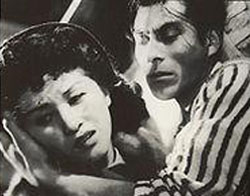 The doc has managed to convince Matsunaga to follow some of his advice to cure his lungs. But Okada's influence gets him backsliding & he begins to look sicker & sicker. The doc has managed to convince Matsunaga to follow some of his advice to cure his lungs. But Okada's influence gets him backsliding & he begins to look sicker & sicker.
At a big band club Mifune jitterbugs to the hot jazz of an amazing singer, Shizuko Kasagi, Japan's female Cab Calloway.
Shuzuko was one of Japan's biggest stars of the immediate post-war period, and Drunken Angel just about the only chance for Americans to see her in her prime, though she does appear in a couple other films vastly less likely to be seen in America.
Matsunaga's drinking & carousing brings about a collapse. The big yakuza oyabun or godfather (Masao Shimizu) has no patience for Matsunaga's illness & gives his territory to Okada. Matsunaga's girlfriend Nanae (Michiyo Kogure) also switches her affections to Okada, having feared Matsunaga's disease.
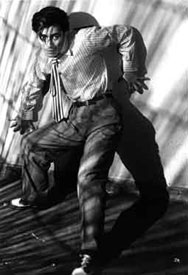 He becomes an in-patient at the doc's house, where he realizes his "friend" Okada is causing considerable grief to the old doctor for protecting Miyo from his abuses. He becomes an in-patient at the doc's house, where he realizes his "friend" Okada is causing considerable grief to the old doctor for protecting Miyo from his abuses.
Sick though he is, Matsunaga's fondness for & sense of obligation toward the doc induces him to set out to settle the matter, yakuza to yakuza.
He'd been a big man in a slum village, but as everything he has known is stripped away from him, Matsunaga becomes only his disease, a personfication of death. Sallow-faced, hardly able to stand, he goes after the villain with a switchblade.
But in spasms coughing blood, his enemy gets the drop on him, & the climactic fight is pathetic, the complete opposite of the heroic duel that provides the finale of so many other films.
A brilliantly scripted, brilliantly scored, brilliantly acted film noir, Kurosawa has unveiled a bitterly cynical world in which human decency has no reward. It's Kurosawa's first seriously significant film, the first time he broke free of the restraints of "studio product."
He regarded Drunken Angel as really his first film, though I would argue that of his earlier films, at least They Who Step on the Tiger's Tail (Tora no o wo fumu otokotachi, 1945) transcended the studio-assignment.
Drunken Angel garnered him the Kinema Junpo Award (Japan's Oscar) for best director, & he would continue with his two greatest stars, Mifune & Shimura, for some of the greatest films the world has received, including Rashomon (1950) & Seven Samurai (1954).
copyright © by Paghat the Ratgirl
|
